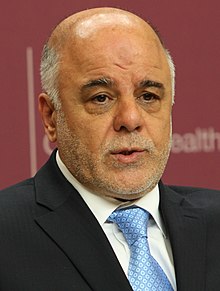Haider al-Abadi | |
|---|---|
حيدر العبادي | |
 Al-Abadi in 2015 | |
| Prime Minister of Iraq | |
| In office 8 September 2014 – 25 October 2018 | |
| President | Fuad Masum
Barham Salih |
| Deputy | Saleh al-Mutlaq Baha Araji Hoshyar Zebari Rowsch Shaways |
| Preceded by | Nouri al-Maliki |
| Succeeded by | Adil Abdul-Mahdi |
| Leader of the Victory Alliance | |
| Assumed office 14 December 2017 | |
| Preceded by | Position established |
| Deputy Leader of the Islamic Dawa Party | |
| In office 15 January 2007 – 8 September 2014 | |
| Preceded by | Nouri al-Maliki |
| Succeeded by | Baha Araji |
| Minister of Communications | |
| In office 1 September 2003 – 1 June 2004 | |
| Prime Minister | Iraqi Governing Council |
| Preceded by | Muhammad Saeed al-Sahhaf |
| Succeeded by | Muhammad Ali Hakim |
| Personal details | |
| Born | Haider Jawad Kadhim al-Abadi 25 April 1952 Baghdad, Kingdom of Iraq |
| Citizenship | Iraq, United Kingdom |
| Political party | Victory Alliance |
| Other political affiliations | Islamic Dawa |
| Children | 3 |
| Alma mater | University of Technology University of Manchester |
| Profession | Politician |
| Signature | |
Haider Jawad Kadhim al-Abadi (Arabic: حيدر جواد كاظم العبادي; born 25 April 1952) is an Iraqi politician who was Prime Minister of Iraq from September 2014 until October 2018. Previously he served as Minister of Communication from 2003 to 2004, in the first government after Saddam Hussein was deposed.[1]
He was designated as prime minister by President Fuad Masum on 11 August 2014 to succeed Nouri al-Maliki[2] and was approved by the Iraqi parliament on 8 September 2014.[3] Al-Abadi was included in Time magazine's 100 Most Influential People of 2018.[4]
In office throughout the majority of the War in Iraq (2013–2017) which he announced victory against ISIL, he later left the office of Prime Minister in 2018, following rising domestic discontent and widespread violent protests.[5][6][7]
- ^ "Haider al- Abadi - Munzinger Biographie". munzinger.de. Retrieved 6 July 2021.
- ^ Pearson, Mike; Yan, Holly; Coren, Anna (11 August 2014). "Iraq's Nuri al-Maliki digs in as President nominates new Prime Minister". CNN. Retrieved 8 September 2014.
- ^ "Iraqi Parliament approves the new government of Abadi and the vice-presidents of Fuad Masum". 8 September 2014.
{{cite web}}: Missing or empty|url=(help) - ^ "Haider al-Abadi: The World's 100 Most Influential People". Time. Retrieved 23 September 2020.
- ^ Cornish, Chloe; Khattab, Asser (11 September 2018). "Iraq prime minister Haider Al-Abadi faces calls to step down". Financial Times. Archived from the original on 10 December 2022. Retrieved 13 February 2022.
- ^ "The End Is Near for Iraq's Haider al-Abadi". Time. Retrieved 13 February 2022.
- ^ AFP. "Iraq's top two parliament groups demand PM Abadi resign after Basra violence". www.timesofisrael.com. Retrieved 13 February 2022.